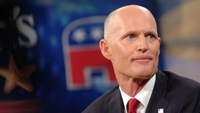Florida governor vetoes funding for PBS

Florida’s Republican Gov. Rick Scott has vetoed Florida’s nearly $4.8 million dollar appropriation for public broadcasting, leaving a major loss in funding for 13 public television stations and 13 public radio stations in the state.
Funding in Florida had already been reduced by 30 percent from the amount the broadcasters received last year. With the cuts, each of 13 public radio stations will lose $87,287 in state funds compared with last year, and each of the 13 public television stations will lose a subsidy of $434,837. Stations receive the same subsidy, regardless of size.
“For me, it is critical; for a small station it might be catastrophic,” Rick Schneider, president and chief executive of Miami’s WPBT-TV, told the New York Times. He said there was “no doubt that people are going to have to look at layoffs” and that he would not be surprised if some stations were shut down. The broadcasters are working to get the funds reinstated.
Orlando’s WMFE-TV, citing financial difficulties, had already decided to leave PBS. It is selling itself to a religious broadcaster and will end PBS programming on July 1.
Last week, the University of Central Florida (UCF) in Orlando announced that it reached a partnership deal with WBCC, at Brevard Community College in nearby Cocoa. UCF will invest up to $1 million in the college station, which had been the market’s secondary PBS station (and already offered some UCF programming on a digital subchannel).
If PBS approves, the station — to be renamed WUCF — will now become the primary PBS station in the central Florida market.
Grant J. Heston, the university’s assistant vice president who is in charge of overseeing UCFTV, told the Times that as the university with the nation’s second-largest enrollment, UCF believed it had a base that “will help us generate that community support” needed to operate the station.
Get the TV Tech Newsletter
The professional video industry's #1 source for news, trends and product and tech information. Sign up below.
Officials had set conservative initial fundraising goals and would operate “as lean and efficient as possible.”
